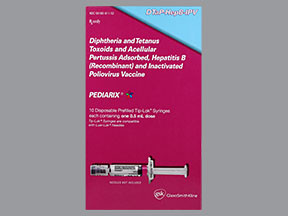DIPHTHERIA/TETANUS/PERTUSSIS/HEPATITIS B/POLIO VACCINE - INJECTION
PHONETIC PRONUNCIATION: (dip-THEER-ee-uh/TET-un-us/per-TUSS-iss/ hep-uh-TIE-tuss B/POE-lee-oh)
COMMON BRAND NAME(S): Pediarix
GENERIC NAME(S): hep B virus,rcmb/dipth,pertus(acell),tet,polio vaccine/PF
Uses
USES: This medication is a combination of vaccines. It is given to children between the ages of 6 weeks and 7 years old to prevent certain serious diseases: diphtheria, tetanus (lockjaw), pertussis (whooping cough), hepatitis B, and polio. Vaccination is the best way to protect (provide immunity) against these life-threatening diseases. Vaccines work by getting the body to make its own protection (antibodies).
How to use DIPHTHERIA/TETANUS/PERTUSSIS/HEPATITIS B/POLIO VACCINE - INJECTION
HOW TO USE: Read all vaccine information available from your health care professional before receiving the vaccine. If you have any questions, ask your health care professional. This vaccine is given by injection into a muscle by a health care professional. It is usually given in the thigh in infants and in the upper arm in older children. This vaccine is usually given in a series of 3 doses at 2, 4, and 6 months of age or as directed by the health care professional. Closely follow the vaccination schedule provided by the health care professional.
Side Effects
Precautions
Interactions
Overdose
Images
Reviews
Faq for DIPHTHERIA/TETANUS/PERTUSSIS/HEPATITIS B/POLIO VACCINE - INJECTION
The DTaP/HepB/IPV vaccine is a combination vaccine that protects against diphtheria, tetanus, pertussis (whooping cough), hepatitis B, and polio. It is given as an injection to provide immunity against these diseases.
The DTaP/HepB/IPV vaccine is typically given to infants and children in a series of doses. The first dose is usually given at 2 months of age, followed by additional doses at 4 months, 6 months, and 15-18 months of age. Booster doses are given between the ages of 4-6 years.
Common side effects of the DTaP/HepB/IPV vaccine may include pain, redness, or swelling at the injection site, mild fever, fussiness, or lack of appetite. These side effects are usually mild and temporary.
The DTaP/HepB/IPV vaccine provides long-lasting immunity against diphtheria, tetanus, pertussis, hepatitis B, and polio. However, booster doses are recommended to maintain protection throughout childhood and adulthood.
Yes, the DTaP/HepB/IPV vaccine can be given at the same time as other routine childhood vaccines, such as the pneumococcal conjugate vaccine or the Haemophilus influenzae type b vaccine. This is known as combination vaccination and is convenient and safe.
Not getting the DTaP/HepB/IPV vaccine can leave your child susceptible to serious and potentially life-threatening diseases. Diphtheria, tetanus, pertussis, hepatitis B, and polio can cause severe complications and even death. By vaccinating your child, you help protect them and contribute to community immunity.
Disclaimer
IMPORTANT: HOW TO USE THIS INFORMATION: This is a summary and does NOT have all possible information about this product. This information does not assure that this product is safe, effective, or appropriate for you. This information is not individual medical advice and does not substitute for the advice of your health care professional. Always ask your health care professional for complete information about this product and your specific health needs.

No Reviews Yet